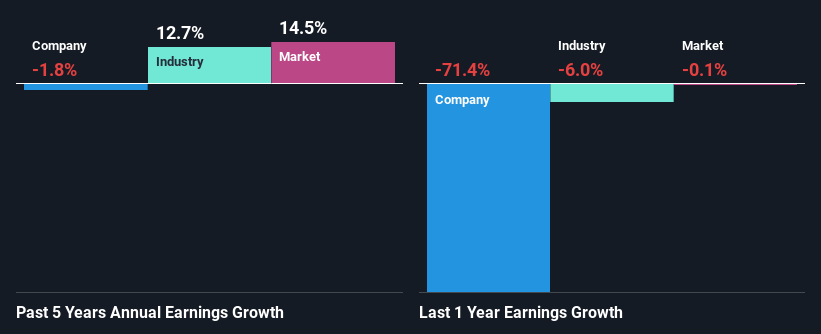Avient Corporation's (NYSE:AVNT) Stock's Been Going Strong: Could Weak Financials Mean The Market Will Correct Its Share Price?
Avient's (NYSE:AVNT) stock is up by a considerable 14% over the past three months. However, we decided to pay close attention to its weak financials as we are doubtful that the current momentum will keep up, given the scenario. In this article, we decided to focus on Avient's ROE.
Return on equity or ROE is an important factor to be considered by a shareholder because it tells them how effectively their capital is being reinvested. In other words, it is a profitability ratio which measures the rate of return on the capital provided by the company's shareholders.
View our latest analysis for Avient
How To Calculate Return On Equity?
ROE can be calculated by using the formula:
Return on Equity = Net Profit (from continuing operations) ÷ Shareholders' Equity
So, based on the above formula, the ROE for Avient is:
1.4% = US$32m ÷ US$2.3b (Based on the trailing twelve months to September 2023).
The 'return' is the amount earned after tax over the last twelve months. So, this means that for every $1 of its shareholder's investments, the company generates a profit of $0.01.
What Has ROE Got To Do With Earnings Growth?
Thus far, we have learned that ROE measures how efficiently a company is generating its profits. Based on how much of its profits the company chooses to reinvest or "retain", we are then able to evaluate a company's future ability to generate profits. Assuming all else is equal, companies that have both a higher return on equity and higher profit retention are usually the ones that have a higher growth rate when compared to companies that don't have the same features.
A Side By Side comparison of Avient's Earnings Growth And 1.4% ROE
It is quite clear that Avient's ROE is rather low. Not just that, even compared to the industry average of 14%, the company's ROE is entirely unremarkable. As a result, Avient's flat earnings over the past five years doesn't come as a surprise given its lower ROE.
We then compared Avient's net income growth with the industry and found that the average industry growth rate was 13% in the same 5-year period.
Earnings growth is an important metric to consider when valuing a stock. It’s important for an investor to know whether the market has priced in the company's expected earnings growth (or decline). This then helps them determine if the stock is placed for a bright or bleak future. Is AVNT fairly valued? This infographic on the company's intrinsic value has everything you need to know.
Is Avient Using Its Retained Earnings Effectively?
With a high three-year median payout ratio of 60% (implying that the company keeps only 40% of its income) of its business to reinvest into its business), most of Avient's profits are being paid to shareholders, which explains the absence of growth in earnings.
Additionally, Avient has paid dividends over a period of at least ten years, which means that the company's management is determined to pay dividends even if it means little to no earnings growth. Our latest analyst data shows that the future payout ratio of the company is expected to drop to 34% over the next three years. The fact that the company's ROE is expected to rise to 9.8% over the same period is explained by the drop in the payout ratio.
Conclusion
On the whole, Avient's performance is quite a big let-down. The company has seen a lack of earnings growth as a result of retaining very little profits and whatever little it does retain, is being reinvested at a very low rate of return. With that said, we studied the latest analyst forecasts and found that while the company has shrunk its earnings in the past, analysts expect its earnings to grow in the future. To know more about the company's future earnings growth forecasts take a look at this free report on analyst forecasts for the company to find out more.
Have feedback on this article? Concerned about the content? Get in touch with us directly. Alternatively, email editorial-team (at) simplywallst.com.
This article by Simply Wall St is general in nature. We provide commentary based on historical data and analyst forecasts only using an unbiased methodology and our articles are not intended to be financial advice. It does not constitute a recommendation to buy or sell any stock, and does not take account of your objectives, or your financial situation. We aim to bring you long-term focused analysis driven by fundamental data. Note that our analysis may not factor in the latest price-sensitive company announcements or qualitative material. Simply Wall St has no position in any stocks mentioned.

